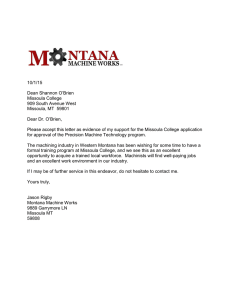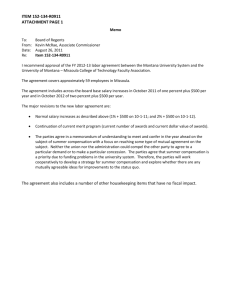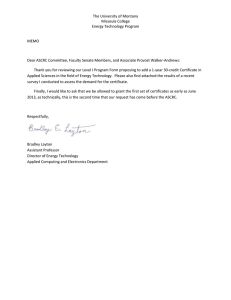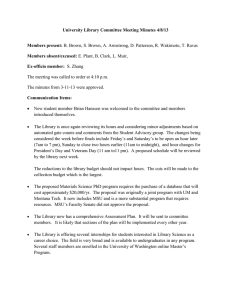UM's Tech Transfer Notes March 2012 Dear Colleague –
advertisement
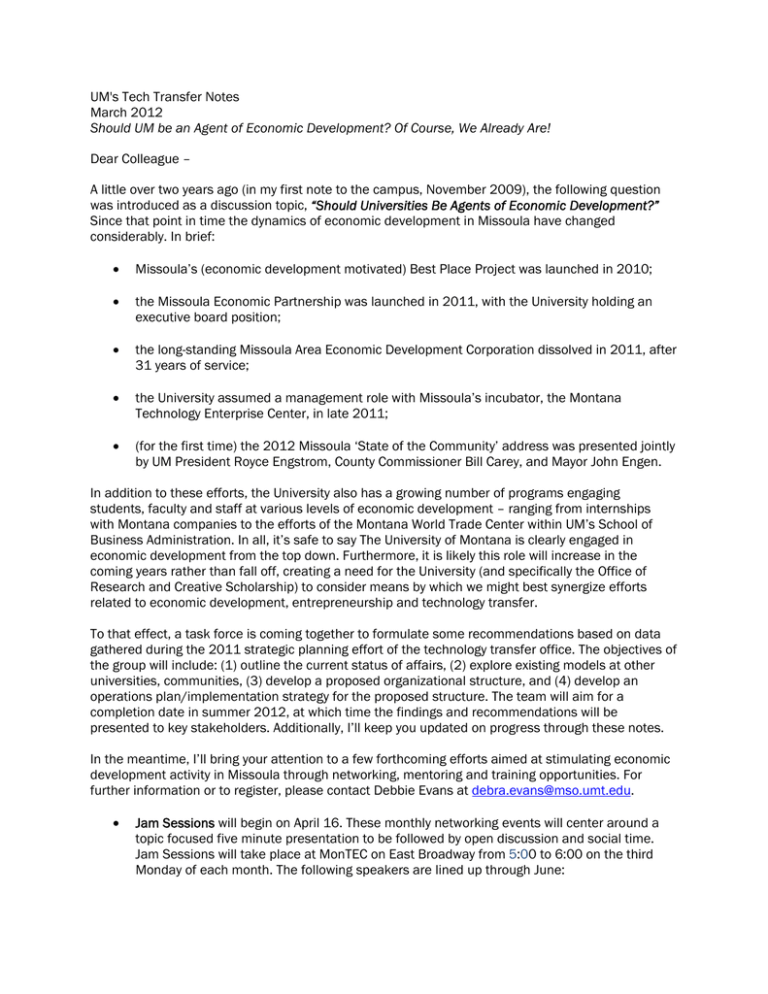
UM's Tech Transfer Notes March 2012 Should UM be an Agent of Economic Development? Of Course, We Already Are! Dear Colleague – A little over two years ago (in my first note to the campus, November 2009), the following question was introduced as a discussion topic, “Should Universities Be Agents of Economic Development?” Since that point in time the dynamics of economic development in Missoula have changed considerably. In brief: • Missoula’s (economic development motivated) Best Place Project was launched in 2010; • the Missoula Economic Partnership was launched in 2011, with the University holding an executive board position; • the long-standing Missoula Area Economic Development Corporation dissolved in 2011, after 31 years of service; • the University assumed a management role with Missoula’s incubator, the Montana Technology Enterprise Center, in late 2011; • (for the first time) the 2012 Missoula ‘State of the Community’ address was presented jointly by UM President Royce Engstrom, County Commissioner Bill Carey, and Mayor John Engen. In addition to these efforts, the University also has a growing number of programs engaging students, faculty and staff at various levels of economic development – ranging from internships with Montana companies to the efforts of the Montana World Trade Center within UM’s School of Business Administration. In all, it’s safe to say The University of Montana is clearly engaged in economic development from the top down. Furthermore, it is likely this role will increase in the coming years rather than fall off, creating a need for the University (and specifically the Office of Research and Creative Scholarship) to consider means by which we might best synergize efforts related to economic development, entrepreneurship and technology transfer. To that effect, a task force is coming together to formulate some recommendations based on data gathered during the 2011 strategic planning effort of the technology transfer office. The objectives of the group will include: (1) outline the current status of affairs, (2) explore existing models at other universities, communities, (3) develop a proposed organizational structure, and (4) develop an operations plan/implementation strategy for the proposed structure. The team will aim for a completion date in summer 2012, at which time the findings and recommendations will be presented to key stakeholders. Additionally, I’ll keep you updated on progress through these notes. In the meantime, I’ll bring your attention to a few forthcoming efforts aimed at stimulating economic development activity in Missoula through networking, mentoring and training opportunities. For further information or to register, please contact Debbie Evans at debra.evans@mso.umt.edu. • Jam Sessions will begin on April 16. These monthly networking events will center around a topic focused five minute presentation to be followed by open discussion and social time. Jam Sessions will take place at MonTEC on East Broadway from 5:00 to 6:00 on the third Monday of each month. The following speakers are lined up through June: o April 16. James Stephens (President, Blue Marble) The Pivot, Making strategic changes and the impact on employees and stakeholders o May 21. Ed Wetherbee (Entrepreneur in Residence, UM) How venture capital firms work, and why they want so much (Part 1) o June 18. Jim Wingard (Legal Director, the legal atlas) Working with universities, expectations and reality • Later this year, the Kaufmann Foundation’s TechVenture program will come to Missoula. The ten week offering is based on a progressive topic list which focuses on evaluating business concept feasibility, building a business plan, and developing an investor pitch. The format of each session includes a guest speaker, facilitated discussion, and business coaching. This program has roots in Research Triangle Park and is considered ideal for faculty and students considering the launch of a high growth company. • In collaboration with the Missoula Economic Partnership, area entrepreneurs (including faculty and students) will have the opportunity to participate in pro bono consulting sessions. Generally speaking, entrepreneurs will have access to expertise (patent attorneys, marketing firms, IT consultants and investment bankers) for discussion of individual areas of business interest in pre-scheduled one-on-one sessions. More to come on this in the near future. As always, I appreciate hearing from you and welcome any and all feedback. Happy Spring! Joe Joe Fanguy Director of Technology Transfer The University of Montana
